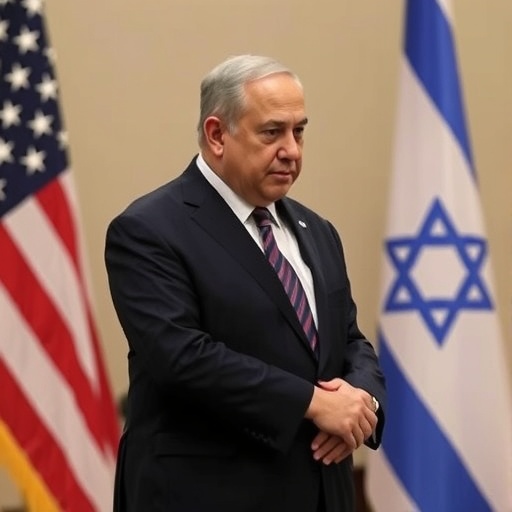Urgent U.S.-Israel Talks Intensify as Netanyahu Warns of Gaza Ceasefire Collapse Amid Rising Tensions
In a move that has sent shockwaves through the international community, top U.S. officials have rushed to Israel for emergency negotiations following Israeli Prime Minister Benjamin Netanyahu’s dire warning that the fragile ceasefire in Gaza could collapse at any moment. The announcement, delivered during a tense address to the Knesset on Tuesday, underscores the precarious balance of peace efforts in the region, where ongoing skirmishes and accusations of violations threaten to reignite full-scale conflict. As rockets sporadically light up the night sky over Gaza, the arrival of these high-level diplomats signals a desperate bid to avert disaster.
Netanyahu’s Fiery Ultimatum Echoes Through Jerusalem
Prime Minister Benjamin Netanyahu’s rhetoric has rarely been more pointed. Speaking from the podium of Israel‘s parliament, he declared that the ceasefire agreement with Hamas, brokered just months ago under intense international pressure, is hanging by a thread. “We cannot and will not tolerate endless provocations,” Netanyahu stated, his voice laced with frustration. He accused Palestinian militants in Gaza of repeated breaches, including the launch of incendiary devices toward Israeli border communities and the smuggling of weapons through underground tunnels. These claims, backed by Israeli military intelligence reports, paint a picture of a truce that is more illusion than reality.
Netanyahu’s warning comes at a critical juncture. The ceasefire, which went into effect in late 2023 after a brutal 15-month war that claimed over 41,000 lives in Gaza alone according to Palestinian health authorities, was meant to provide a breathing space for humanitarian aid and reconstruction. Yet, Israeli officials report at least 12 violations in the past week, including a drone incursion that nearly struck a kibbutz near the border. Netanyahu emphasized that Israel’s patience is not infinite, hinting at potential military responses if the situation deteriorates further. “The security of our people is non-negotiable,” he added, invoking the memory of past escalations that have drawn in regional powers like Iran and Hezbollah.
This isn’t the first time Netanyahu has issued such threats. In 2021, similar warnings preceded Operation Guardian of the Walls, a 11-day conflict that devastated Gaza’s infrastructure. Analysts suggest that domestic political pressures in Israel, including coalition tensions and upcoming elections, may be amplifying his stance. Polls from the Israel Democracy Institute show that 68% of Israelis support a hardline approach to Gaza security, fueling Netanyahu’s resolve.
U.S. Officials Land in Tel Aviv for High-Stakes Diplomacy
The swift deployment of senior U.S. officials to Israel marks a pivotal chapter in Washington’s long-standing role as a mediator in the Israeli-Palestinian conflict. Leading the delegation is U.S. Secretary of State Antony Blinken, accompanied by National Security Advisor Jake Sullivan and special envoy for Middle East peace, Brett McGurk. Their plane touched down at Ben Gurion Airport late Monday, where they were greeted by a somber Israeli foreign minister amid flashing cameras and heightened security.
The purpose of this visit is clear: to reinforce the Gaza ceasefire and prevent a spiral into broader violence. In a joint statement released by the White House, President Joe Biden reiterated America’s “ironclad commitment” to Israel’s security while urging all parties to exercise restraint. “The United States stands ready to facilitate dialogue that ensures lasting stability,” the statement read. Blinken’s itinerary includes closed-door meetings with Netanyahu at the Prime Minister’s residence in Jerusalem, followed by consultations with Palestinian Authority representatives in Ramallah.
U.S. involvement isn’t new, but the urgency is palpable. The Biden administration has invested over $3.8 billion in annual military aid to Israel, making it a key ally whose actions reverberate globally. Sources close to the talks indicate that the U.S. team is pushing for confidence-building measures, such as easing restrictions on Gaza’s fishing zones and accelerating aid deliveries. However, challenges abound. Netanyahu has reportedly resisted calls for unilateral concessions, insisting that Hamas must first dismantle its rocket stockpiles, estimated by the IDF to number in the thousands.
Diplomatic cables leaked to The New York Times reveal that U.S. officials are also addressing broader concerns, including Iran’s role in arming Gaza militants. With proxy conflicts flaring in Lebanon and Yemen, the Gaza ceasefire’s survival is seen as a linchpin for regional de-escalation. Sullivan, known for his hawkish views on Middle East security, is expected to brief Netanyahu on intelligence sharing that could bolster Israel’s defenses without immediate escalation.
Gaza’s Ground Zero: A Ceasefire Under Siege by Daily Struggles
On the ground in Gaza, the ceasefire feels more like a tenuous pause than true peace. The densely populated enclave, home to over 2.3 million Palestinians, grapples with the scars of conflict. According to the United Nations Relief and Works Agency (UNRWA), more than 1.9 million people remain displaced, crammed into makeshift shelters amid rubble-strewn streets. The humanitarian crisis has worsened, with unemployment hovering at 45% and 80% of the population reliant on aid.
Recent incidents underscore the fragility. Just last Friday, Israeli forces intercepted a barrage of 20 rockets from Gaza, prompting airstrikes on what the military described as “terror infrastructure.” Palestinian officials report that these strikes injured 15 civilians, including children, in Khan Younis. Hamas, the de facto rulers of Gaza, has denied launching the rockets, blaming rogue factions, but Israeli intelligence links them directly to the group’s arsenal.
Statistics paint a grim reality. The World Health Organization notes that Gaza’s hospitals operate at 200% capacity, with chronic shortages of medicine and fuel. Clean water access is limited to four hours a day for most residents, exacerbating diseases like hepatitis A. Children, who make up half of Gaza’s population, bear the brunt: A UNICEF report highlights that 1 in 3 kids shows signs of acute malnutrition. Amid this, smuggling networks thrive, funneling everything from construction materials to weapons through Egypt’s Rafah crossing, which has seen a 30% uptick in illicit activity since the ceasefire began.
Voices from Gaza add emotional depth. Ayman al-Sayed, a 42-year-old father from Gaza City, told reporters, “We want peace, but how can we live like this? Every night, we fear the bombs will return.” His words echo the desperation felt by many, as international aid—totaling $1.2 billion pledged at the Cairo Summit—trickles in slowly due to bureaucratic hurdles and security checks.
Global Powers Weigh In on Israel’s Gaza Standoff
The threat to the Gaza ceasefire has drawn sharp reactions from around the world, amplifying the stakes for U.S. officials in Israel. The European Union, through High Representative Josep Borrell, expressed “deep concern” over Netanyahu’s statements, calling for an immediate resumption of talks under UN auspices. “Escalation benefits no one; it only deepens the suffering,” Borrell said in Brussels.
Arab nations, traditionally divided on the issue, are aligning against potential conflict. Egypt, which hosts key mediation channels, has warned that a ceasefire collapse could destabilize the Sinai Peninsula. Saudi Arabia’s foreign ministry issued a statement urging restraint, while hinting at progress on normalization with Israel if peace holds. In contrast, Iran-backed groups like Hezbollah have ramped up rhetoric, with the Lebanese militant leader vowing support for Gaza if Israel acts aggressively.
The United Nations Security Council held an emergency session on Wednesday, where Secretary-General António Guterres pleaded for de-escalation. “The people of Gaza have endured enough; let us not squander this fragile opportunity,” he implored. Resolutions condemning violations have been floated, but veto threats from the U.S. ensure they remain symbolic.
Closer to home, U.S. domestic politics add layers. Progressive Democrats like Senator Bernie Sanders have criticized Netanyahu’s approach, while Republican leaders back Israel’s right to self-defense. A recent Gallup poll shows 55% of Americans support the ceasefire, reflecting war fatigue after decades of involvement.
- Key International Reactions:
- EU: Pushes for multilateral talks.
- Egypt: Offers to host Hamas-Israel dialogues.
- UN: Calls for humanitarian corridors.
- Iran: Warns of regional backlash.
Pathways Forward: Can Diplomacy Salvage the Gaza Ceasefire?
As U.S. officials huddle with Netanyahu and Palestinian leaders, the road ahead is fraught with uncertainty but not without hope. Short-term goals include verifying compliance through joint monitoring teams, potentially involving Qatar and the UAE as guarantors. Long-term, experts advocate for a two-state solution framework, though Netanyahu has dismissed it as unrealistic amid ongoing settlements in the West Bank.
Potential breakthroughs could emerge from economic incentives. The U.S. has floated a $500 million reconstruction package for Gaza, tied to demilitarization pledges. Tech collaborations between Israeli firms and Palestinian startups might foster goodwill, building on initiatives like the Abraham Accords.
Yet, risks loom large. If talks fail, analysts from the Brookings Institution predict a 70% chance of renewed hostilities within months, drawing in Hezbollah and straining U.S. resources. Optimists point to past successes, like the 2014 ceasefire that held for years. As Blinken prepares to depart Israel, his final words may set the tone: “Peace is possible, but it demands courage from all sides.” The world watches, hoping this diplomatic surge prevents another chapter of tragedy in Gaza and beyond.
In the coming days, expect updates on any agreements reached, as the implications ripple from Jerusalem to Washington and the streets of Gaza. Stakeholders urge vigilance, knowing that one misstep could unravel years of fragile progress.








